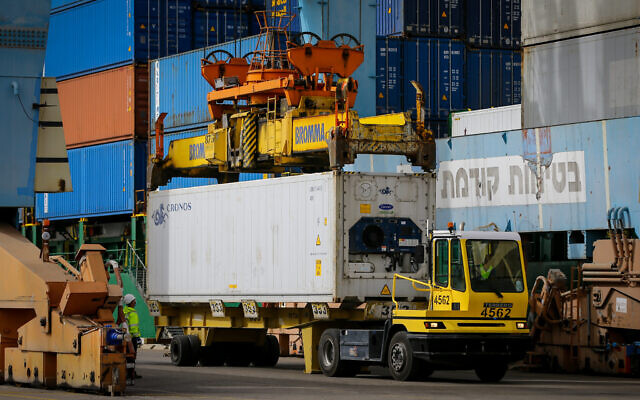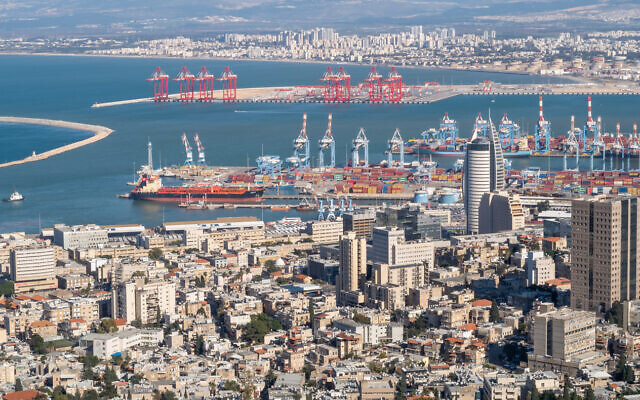
Ashdod Port, located a mere 25 miles from Tel Aviv, is a crucial maritime gateway for all manner of goods traveling to and from Israel and is surrounded by logistics companies and warehouses of the kind found at other leading ports around the world. But the port is also situated near the Gaza border — some 31 miles as the crow flies. With bombs and missiles suddenly flying through the skies of Gaza and southern Israel, Evergreen Line decided it was no longer safe for the Ever Cozy to call Ashdod.
The ship was instead diverted farther north to Haifa Port at Israel’s northernmost tip, from where its cargo somehow had to find its way to its intended recipients. A few days later, Ashdod was looking quiet, with marine traffic websites showing only a few vessels docked at the port or waiting to enter it. Meanwhile, Haifa was having to absorb significant traffic from Ashdod.
Other shipping lines and their insurers are also reviewing the advisability of calling Israeli ports right now due to the conflict. Israeli waters are already in shipping’s highest risk category, and now risk premiums are up by several hundred percent. Israel’s looming ground invasion of Gaza risks making merchant vessels’ journeys to and from Israeli ports even more dangerous and expensive.
That matters because Israel is highly dependent on imports. As the US Department of Agriculture noted in a 2022 report, Israel relies almost exclusively on imports for its consumption of sugar, vegetable oils and oilseeds, feed, grain, and other raw materials for the food industry, while its meat industry relies on imports of live animals. Israel imports almost three times as much food and agricultural products as it exports. Those goods travel through the ports of Ashdod and Haifa.
Get The Times of Israel's Daily Edition by email and never miss our top stories
Shipping lines and their underwriters are getting decidedly nervous about Israeli port calls. Israeli and Lebanese ports are already in London insurers’ highest risk category, which means that shipping lines need their insurers’ agreement for all port calls there and pay a war risk premium for doing so. (London insurers dominate global maritime insurance and form the global standard.)
At the moment, the war risk premium paid by shipping lines for a vessel calling Ashdod has a typical headline rate of 0.65 percent of the vessel’s total value. Libya’s Tripoli Port — itself a risky destination — has a headline rate of 0.4 percent, the same rate Haifa now incurs. Benghazi and other Libyan ports incur relatively headline rates of 0.13 and 0.15 percent, respectively. Yemen’s Hudaydah and Salif ports cost 0.75 percent, while its ports of Aden and Mukalla only incur headline rates of 0.35 percent. Even Mogadishu Port in Somalia is cheaper than Ashdod, at 0.5 percent. In fact, only Russia’s and Ukraine’s Black Sea ports incur significantly higher war risk premiums than Ashdod does, at 1 percent of the total vessel value.

Ashdod Port workers unload containers with millions of eggs imported from Spain, April 5, 2020 (Flash90)
The high Israeli rates reflect the risk of merchant ships being harmed in Israeli waters. “Nobody wants to go into a port and not be able to get out, as happened in Ukraine,” said Neil Roberts, a secretary of the Joint War Committee, a maritime body that classifies international waters according to risk. Indeed, ship owners and insurers have had to revise their assessment of Israeli authorities’ ability to keep the country safe.
“What insurers and ship owners look at the moment is Israel’s ability to fend off attacks,” said Simon Lockwood, a maritime executive with WTW, the global insurance broker. “The fact that Hamas managed to conduct all these attacks this month has already led to a several hundred percent increase in war premiums for journeys to Israeli ports.” (Full disclosure: I occasionally consult for another part of WTW, but my views in this article represent only me.)
Shipping lines are already passing on the increased costs to their customers; by the beginning of this week, a range of shipping lines had added surcharges of $50-$100 per regular-sized container. “Ship owners will pass along the risk to their customers — that’s how war risk always works,” Lockwood said. “But it’s also a question of risk appetite.”
How shipping lines and their insurers assess Israel’s conflict with Hamas — and the prospect of a wider war in the region — has enormous importance for Israel. Due to its location, Israel trades almost exclusively via sea routes. Yet, even before the conflict, calling Israeli ports was complicated, even beyond getting insurance for it. In some cases, USDA noted, “vessels had to wait for weeks before entering the port, with operational queues of up to 60 vessels at a time.” The suddenly very real risk of missiles and other calamities hitting ships in Ashdod adds to those already significant hurdles.

An illustrative view from Mount Carmel of the Haifa port and the Mediterranean Sea, January 2021. (Svarshik via iStock by Getty Images)
And that’s not the end of it, because the increasingly likely conflict with the Lebanese militia Hezbollah would add enormous risks to nearby Haifa. “Should Hezbollah from southern Lebanon get involved, the threat level for the port of Haifa would instantly escalate. While not a direct target, the risk of collateral damage to ships and potential operational disruptions would be of significant concern,” the maritime risk advisory firm Dryad Global noted in a new analysis.
If Hezbollah enters the conflict, Israeli Prime Minister Benjamin Netanyahu said on October 22, “we will strike it with a force it cannot even imagine, and the meaning for it and the Lebanese state will be devastating.” Netanyahu clearly used such belligerent language in an effort to deter Hezbollah, but the powerful group didn’t seem impressed: On the same day, Israeli and Hezbollah forces clashed at Israel’s border with Lebanon. The US government is already urging American citizens to leave Lebanon.
But although Hezbollah may not be frightened by Netanyahu’s words about unimaginable military strikes, shipping lines and their insurers certainly are. Though they’re fiercely nonpolitical, their services are indispensable to shipping-dependent Israel. And if they conclude it’s too risky to call Israeli ports, the country could soon find itself running out of food.


